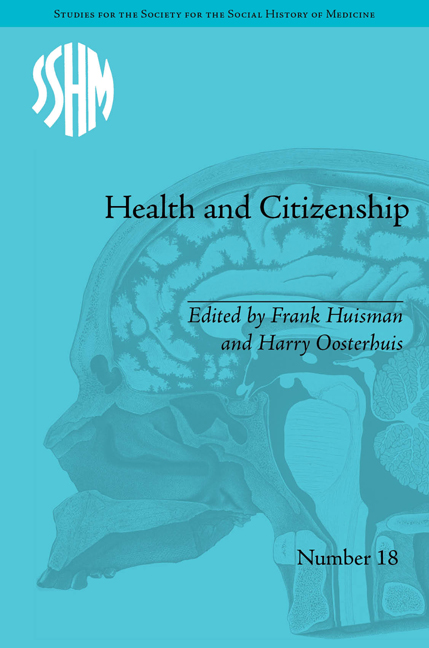Book contents
- Frontmatter
- CONTENTS
- Acknowledgements
- List of Contributors
- The Politics of Health and Citizenship: Historical and Contemporary Perspectives
- Part I Liberal Citizenship and Public Health
- Part II Social Citizenship: Health in the Welfare State
- 5 The Right to Health and Social Citizenship in Germany, 1848–1918
- 6 From Tobacco in the War to the War on Tobacco: Smoking in Britain and Germany from c. 1900 to 1945
- 7 Mental Health and Civic Virtue: Psychiatry, Self-Development and Citizenship in the Netherlands, 1870–2005
- Part III Neo-Republican Citizenship: Health in the Risk Society
- Notes
- Index
6 - From Tobacco in the War to the War on Tobacco: Smoking in Britain and Germany from c. 1900 to 1945
from Part II - Social Citizenship: Health in the Welfare State
- Frontmatter
- CONTENTS
- Acknowledgements
- List of Contributors
- The Politics of Health and Citizenship: Historical and Contemporary Perspectives
- Part I Liberal Citizenship and Public Health
- Part II Social Citizenship: Health in the Welfare State
- 5 The Right to Health and Social Citizenship in Germany, 1848–1918
- 6 From Tobacco in the War to the War on Tobacco: Smoking in Britain and Germany from c. 1900 to 1945
- 7 Mental Health and Civic Virtue: Psychiatry, Self-Development and Citizenship in the Netherlands, 1870–2005
- Part III Neo-Republican Citizenship: Health in the Risk Society
- Notes
- Index
Summary
By the end of the twentieth century, international epidemiological evidence on smoking and passive smoking and the risks which they posed to the individual and the community respectively were widely accepted. Indeed, tobacco use provided one of the key foundations of the new public health, with expert knowledge, an evidence base, advocacy groups and central government pressure combining with a lifestyle focus on individual behaviour to move anti-smoking campaigns beyond a peripheral concern to centre stage. While the new public health put the onus on the individual to take responsibility for their health status as a mark of citizenship, state and non-government organizations and initiatives seeking to guide people to make the correct choices mushroomed. National education and policy programmes became a matter of international concern, with cross-European initiatives and global developments, such as the World Health Organization's Framework Convention on Tobacco Control. Countries which lagged behind or did not wholly subscribe to the anti-smoking ethos were castigated in the medical and public health press. For example, talking about slow European progress on smoking policy in 2002, the director of English anti-smoking organization Action on Smoking and Health, was quoted as saying, ‘Europe is moving at the speed of its slowest ship, Germany, and that ship has got the tobacco industry on the bridge’.
In the narrative which developed in the early 2000s, Britain was seen to be at the forefront of developments in anti-smoking advocacy, while Germany was seen as much more liberal and even blocking legislation.
- Type
- Chapter
- Information
- Health and CitizenshipPolitical Cultures of Health in Modern Europe, pp. 141 - 154Publisher: Pickering & ChattoFirst published in: 2014



